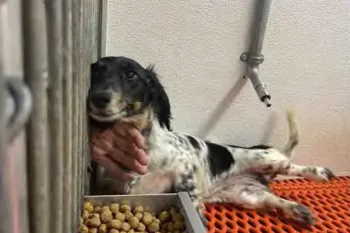At a property in Illinois buzzing with hundreds of flies, a water bucket stood empty in an enclosure where three puppies were living. When the bucket was finally refilled, a federal inspector observed the puppies as they desperately “climbed on top of each other trying to get water.” At another breeder’s property in Iowa, state inspectors found dogs who were limping and dogs with matted fur living in a “nearly overwhelming” odor of waste.
We’ve said it before and we’ll say it again and again: Puppy mills treat mother and father dogs as nothing more than breeding machines, and their young as little more than commodities. Federal inspections of massive commercial breeding facilities are already scant; these conditions are allowed to persist at puppy mills across the country. Now, reported cuts in staffing at the U.S. Department of Agriculture, which is the federal agency charged with enforcing the federal Animal Welfare Act at facilities such as puppy mills, could strain the system even further, which could mean more dogs at puppy mills will suffer undetected as a matter of merely doing business.
As difficult as it is to hear about these disturbing conditions, it is even more disturbing to think that this suffering goes undetected, often only surfacing when families bring their new puppies home. We must continue to expose the cruel puppy mill pipeline, where dogs from massive breeding facilities are often “laundered” by selling them through attractive storefronts or professional-looking websites.
For the 13th year in a row, we have issued our report exposing 100 known puppy mills across the United States. Our Horrible Hundred report reveals hidden conditions at commercial dog breeders that sell through pet stores, online and even on social media.
At least 30 breeders in the new report have links to the American Kennel Club, a dog registry organization that has claimed to be a champion for dogs but routinely lobbies against stronger legal protections for dogs.
The report also shows links between puppy mills and Petland, the last national chain of pet stores to sell puppies. Petland stores are connected to at least 25 of the breeders in our new report, including a puppy mill where inspectors found a shih tzu with seeping wounds (Nelson Hochstetler in Illinois), a mill that had its USDA license revoked (C&J’s Happy Tails Kennel in Missouri), and a mill where state inspectors found underweight dogs with their spines and pelvic bones visible (Berntsen Living Trust in Kansas).
We also found many Horrible Hundred dealers advertising their puppies on social media sites such as Facebook and Instagram, as well as on online classified websites such as Puppies.com and LancasterPuppies.com.
We must keep pulling the curtain back on these issues every year to keep the momentum going to stop puppy mills from mistreating dogs. This work is essential to raise public awareness and to influence the priorities of public policy and its protections for animals. We must come together to stop dogs from suffering in puppy mills by passing new humane pet store laws, supporting federal reforms such as the Puppy Protection Act and the Better CARE for Animals Act, and ensuring that agencies hold breeders accountable for the treatment of the dogs in their care.
Exposing specific puppy mills has an impact. In March, news outlets reported that our 2024 report was used to secure a warrant that resulted in the rescue of almost 50 dogs at BR’s Dobermans in Iowa. At least 2,400 animals from other facilities that have appeared in our prior reports have also been rescued over the years. In addition, in 2024 the USDA revoked the licenses of at least four puppy mills that appeared in our reports, and some others were fined or penalized.
Puppy millers want their practices to remain hidden. But we will never shy away from exposing the cruel conditions where too many puppies start their lives, and too many mother and father dogs lose theirs. Animals, and the people who care about them, deserve better than that.
Sara Amundson is president of Humane World Action Fund.

